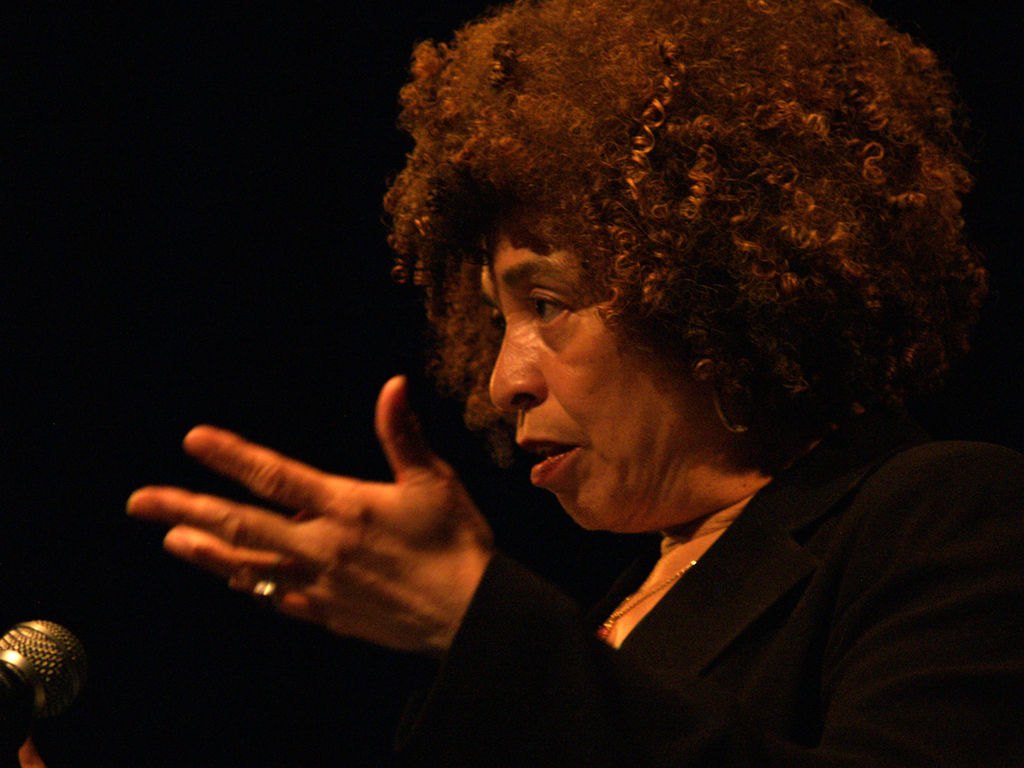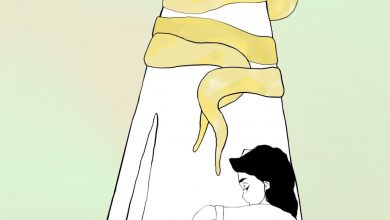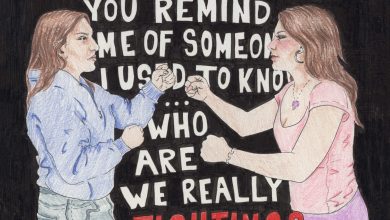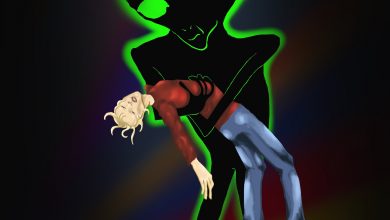Angela Davis: Prolific Poet, Professor, and Activist

Image: “Angela Davis speaking at Myer Horowitz Theatre of the University of Alberta” by Nick Wiebe, via CC BY 2.5 / Wikimedia Commons.
There is no way I can think of revolutionary existence without thinking of Dr. Angela Davis. And as a student at UCLA, I cannot help but cringe at the fact that my parents’ tuition money goes to an institution that removed her from her teaching position within her first year (1969) as a working professor. As I continue to educate myself about her and the legacy she continues, one of the most unsettling feelings I end up with is a sense of shame so grand that it often has a ripple effect.
Not only am I reminded of white America’s history of brutal institutionalization of racism on a daily basis, but through Davis’s experiences, activism, and words I gain a more concrete perspective on the terrifying dangers of white supremacy and its dominant role in America’s policies and regulations. Dr. Davis possesses an acute awareness of the modern racialized politics that result in extreme injustices against Black people. While instances of racial injustice in the 20th century tend to be purposefully omitted in U.S. history textbooks and curriculum (especially after 1968, the year of Martin Luther King’s assassination), Davis expresses a more progressive perspective that prioritizes equity as a major goal within activism, more so than equality.
It is one thing to leave out the ideologies of the Black Panther Party in history lessons because of the movement’s continuous focus on challenging the oppressive qualities of authoritative powers. However, I have realized how broken the system is when the long history of hate violence towards Black people in the U.S. is thoroughly ignored, even the violence that occurs in the 21st century. And the offensive rhetoric used in portraying African American activists within the media, from Angela Davis to today’s Black Lives Matter protesters, has a significant influence on the common educational curriculum. This type of reporting that favors the image of White terrorists over that of Black people who try defend themselves, is a type that can be seen today in the media’s portrayal of white terrorists in comparison to other minority groups.
It is public figures like Angela Davis who keep you conscious of the way in which systematic oppression starts with mainstream representation and whose experiences remind you how important it is to constantly question your own projections of people of color. For me, that sort of influence is why I think it is extremely important to know who Davis is and what she has accomplished. Especially considering the eye-opening events that have occurred on campus this past academic year, I believe everyone should educate themselves on Dr. Davis’s writings and teachings. Here are some key things to know about this truly kickass woman:
Post Civil Rights Movement:
1969: With pressure from anti-Communist leaders like Ronald Reagan, the UC Board of Regents fired Davis from her post as a philosophy professor at UCLA due to her affiliations with the Communist Party USA and the Black Panther Party.
1970: Angela Davis was placed on the FBI’s Ten Most Wanted List for purchasing the firearms that were used by the Soledad Brothers in their attempted escape from a Marin County courtroom. The President at the time Richard Nixon called her a “terrorist” even though it was completely legal to purchase firearms and register them in one’s name. Davis herself said “The whole apparatus of the state was set up against me. They had all their resources. The FBI, the police. And they began to send me to the death chamber in order to make a point. It really didn’t matter who I was. It was that I was a very convenient figure to make a point that they would suppress any efforts at revolution and liberation.” She spent 18 months incarcerated, during which she participated in a hunger strike. There was massive outcry from the public for her release, which helped significantly in her acquittal two years after her capture.
Activist Work for Prisoners’ Rights:
Late 1990s: Angela Davis co-founded the Critical Resistance, an international grassroots movement that aims “to end the Prison Industrial Complex.” She is still heavily involved in criminal justice work, particularly in defense for women in prison.
Despite UCLA’s removal of Davis as a professor, she is currently a retired Distinguished Professor Emerita in the History of Consciousness and Feminist Studies Departments at UC Santa Cruz. She has authored several books on topics ranging from Black feminism, America’s prison system, intersections of race and class within women identities, and her own autobiography.




